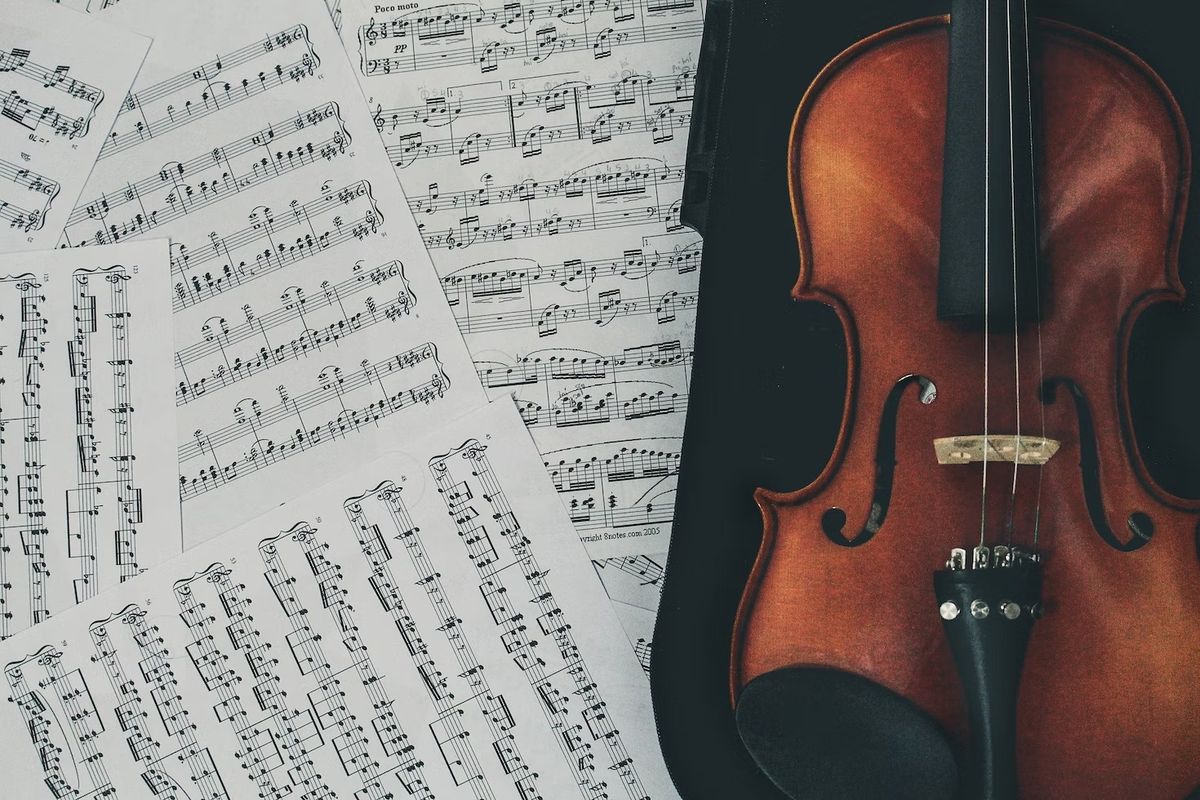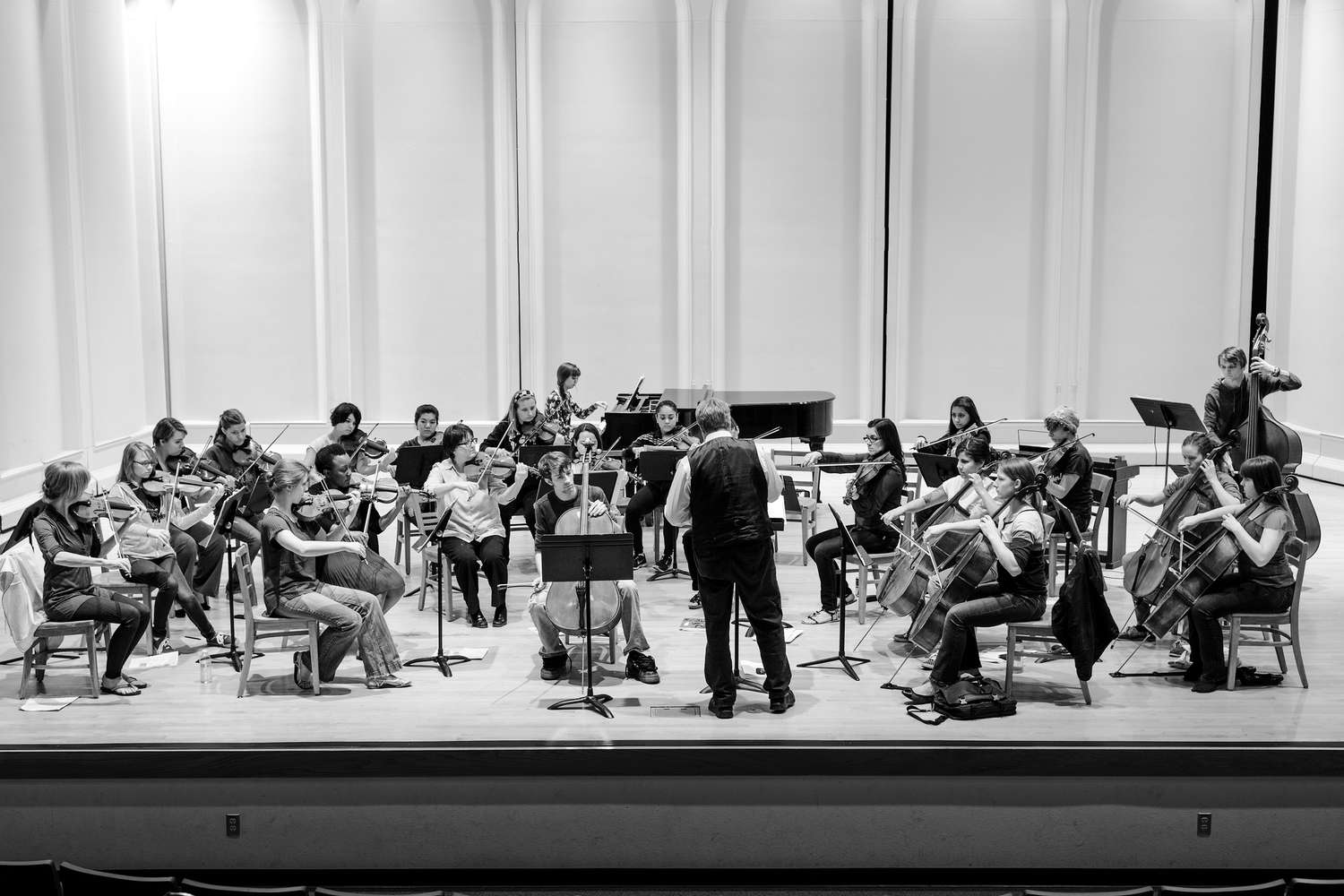Home>Genres>Classical>What Does Classical Music Do To The Brain


Classical
What Does Classical Music Do To The Brain
Modified: February 1, 2024
Discover the impact of classical music on the brain and unlock its potential for cognitive enhancement. Immerse yourself in the soothing melodies that stimulate the mind and promote relaxation.
(Many of the links in this article redirect to a specific reviewed product. Your purchase of these products through affiliate links helps to generate commission for AudioLover.com, at no extra cost. Learn more)
Table of Contents
- Introduction
- The Benefits of Classical Music
- The Impact of Classical Music on Cognitive Abilities
- Classical Music and Emotional Well-being
- Classical Music and Stress Reduction
- Classical Music and Memory Enhancement
- The Influence of Classical Music on Creativity
- Classical Music and Brain Development in Children
- Conclusion
Introduction
Classical music has a long and rich history, rooted in the works of legendary composers such as Mozart, Beethoven, and Bach. This genre of music has stood the test of time and continues to captivate listeners with its timeless melodies and intricate compositions. However, classical music offers much more than just an auditory experience. It has been proven to have numerous beneficial effects on the brain and overall well-being.
In recent years, there has been a surge of interest in the study of how classical music impacts the brain. Researchers have discovered that listening to classical music can have a profound effect on cognitive abilities, emotional well-being, stress reduction, memory enhancement, and even creativity. These findings have sparked a new appreciation for the power of this genre and have led to innovative applications in healthcare, education, and personal development.
One of the key reasons classical music has such a profound impact on the brain is its complex and structured nature. The intricate melodies, harmonies, and rhythms stimulate various regions of the brain, promoting neuroplasticity and enhancing neural connections. This, in turn, leads to a range of cognitive and emotional benefits.
This article will delve into the many benefits of classical music, exploring not only how it affects the brain but also its impact on our emotional well-being and overall quality of life. Whether you are a lifelong fan of classical music or just beginning to explore this genre, you are about to uncover the fascinating ways in which classical music can shape and transform our minds.
The Benefits of Classical Music
Classical music offers a multitude of benefits that extend beyond mere enjoyment. Research has shown that regularly listening to classical music can have positive effects on cognitive abilities, emotional well-being, stress management, memory enhancement, creativity, and even brain development in children.
One of the key benefits of classical music is its impact on cognitive abilities. Studies have found that listening to classical music can enhance focus, attention, and concentration. The intricate melodies and harmonies engage multiple regions of the brain, improving cognitive function and boosting intellectual performance. Whether you’re studying for an exam or working on a challenging project, turning on some classical music can help you enter a state of focused productivity.
Moreover, classical music has been found to have a profound effect on emotional well-being. The soothing melodies and complex arrangements can evoke a wide range of emotions, from tranquility and joy to sadness and nostalgia. This emotional stimulation can help alleviate stress, reduce anxiety, and improve overall mood. It’s no wonder many people turn to classical music as a form of relaxation and stress relief in our fast-paced modern world.
In addition to its impact on cognitive abilities and emotional well-being, classical music has also been found to enhance memory function. The intricate patterns and structures in classical compositions stimulate neural pathways involved in memory processing, improving the retention and recall of information. Research suggests that listening to classical music while studying or engaging in activities that require memory recall can significantly enhance learning and retention.
Furthermore, classical music has been shown to stimulate creativity. The complex harmonies, melodies, and variations present in classical compositions can activate the brain’s creative centers, inspiring imaginative thinking and problem-solving. Many renowned artists and writers have credited classical music as a source of inspiration for their creative endeavors.
Lastly, the benefits of classical music extend to the development of young minds. Studies have revealed that exposure to classical music from a young age can have a positive impact on brain development in children. Listening to classical music can enhance their cognitive abilities, language skills, spatial-temporal reasoning, and even mathematical abilities. Playing classical instruments further enhances these benefits, as it requires coordination, discipline, and focus.
Overall, the benefits of classical music are vast and encompass cognitive, emotional, and developmental aspects. By incorporating classical music into our lives, we can tap into its transformative qualities and reap the numerous rewards it has to offer.
The Impact of Classical Music on Cognitive Abilities
Classical music has a profound impact on cognitive abilities, with numerous studies demonstrating its positive effects on various aspects of mental function. The intricate melodies and complex compositions of classical music engage multiple regions of the brain, leading to improvements in focus, attention, memory, and problem-solving skills.
One of the ways in which classical music impacts cognitive abilities is by enhancing focus and attention. Listening to classical music can help filter out distractions and create a conducive environment for deep concentration. The melodic patterns and harmonies act as a stimulus that can improve attention span and reduce mind wandering. This can be especially beneficial for individuals who struggle with maintaining focus during tasks that require sustained attention, such as studying or working on complex projects.
Moreover, classical music has been found to have a positive impact on memory function. The intricate structures and patterns in classical compositions stimulate neural pathways that facilitate memory formation and retrieval. Studies have shown that listening to classical music can improve memory performance, leading to enhanced learning and recall abilities. This benefit can be particularly valuable for students studying for exams or professionals seeking to retain information for their work.
Another cognitive benefit of classical music is its effect on problem-solving skills. The complex nature of classical compositions challenges the brain to analyze and make sense of intricate patterns and harmonies. This mental exercise can enhance critical thinking and problem-solving abilities. Listening to classical music can stimulate the brain’s analytical and logical thinking processes, facilitating a better approach to solving complex problems.
Furthermore, classical music has the ability to evoke different emotions and moods, and this emotional stimulation can impact cognitive abilities. Research suggests that positive emotions, such as those induced by classical music, can enhance cognitive flexibility and creativity. The emotional resonance of classical music can spark new ideas and perspectives, leading to improved cognitive flexibility and the ability to think outside the box.
Overall, the impact of classical music on cognitive abilities is substantial. By engaging and stimulating various regions of the brain, classical music can enhance focus, attention, memory, problem-solving skills, and cognitive flexibility. Incorporating classical music into daily routines, whether through active listening or background music, can help optimize cognitive functioning and unlock new levels of intellectual prowess.
Classical Music and Emotional Well-being
Classical music has a profound impact on our emotional well-being. Its rich and intricate compositions evoke a wide range of emotions, from tranquility and joy to melancholy and awe. Whether we are actively listening or using it as background music, classical music has the power to uplift our spirits, soothe our souls, and enhance our overall emotional state.
One of the key ways in which classical music affects our emotional well-being is through its ability to reduce stress and anxiety. Listening to classical music has been shown to lower the levels of stress hormones, such as cortisol, in the body. The calming melodies and harmonies of classical compositions have a therapeutic effect on our nervous system, helping to alleviate stress, anxiety, and tension. It provides a sense of relaxation and tranquility, allowing our minds and bodies to unwind.
Moreover, classical music can also enhance our mood and evoke positive emotions. The beauty and complexity of classical compositions can elicit feelings of joy, awe, and wonder. The emotional resonance of the music has the power to transport us to a different state of mind, away from our worries and daily stresses. It can uplift our spirits, improve our mood, and bring a sense of comfort and solace.
In addition to its impact on stress reduction and mood enhancement, classical music can also have a therapeutic effect on individuals dealing with emotional challenges or mental health issues. It has been used as a form of music therapy to support individuals with conditions such as depression, anxiety, and PTSD. The emotional depth and expressiveness of classical music can help individuals process and express their emotions, providing a cathartic experience and promoting emotional healing.
Furthermore, classical music has the ability to enhance mindfulness and present-moment awareness. The immersive experience of listening to classical music can help us become fully absorbed in the present moment, allowing us to let go of worries about the past or future. This mental state of mindfulness can provide a sense of calm, clarity, and inner peace.
Overall, classical music has a profound impact on our emotional well-being. Through its ability to reduce stress and anxiety, enhance mood, provide therapeutic benefits, and promote mindfulness, classical music can be a powerful tool for nurturing our emotional health and enhancing our overall quality of life.
Classical Music and Stress Reduction
Classical music has long been recognized for its ability to reduce stress and promote relaxation. The soothing melodies, harmonies, and rhythms work together to create a calming and tranquil ambiance, providing a much-needed respite from the demands of everyday life.
Listening to classical music can lower the levels of stress hormones in the body, such as cortisol. The gentle and melodic nature of classical compositions has a therapeutic effect on the nervous system, helping to slow down the heart rate, lower blood pressure, and promote a state of deep relaxation. This musical experience can serve as an oasis in our fast-paced and often chaotic world, providing a sense of peace and serenity.
Moreover, classical music has the ability to distract the mind from stress and worries. By engaging our attention and focus, it diverts our thoughts away from stressors and allows us to enter a more positive and relaxed mental state. The intricate patterns and harmonies in classical compositions captivate our minds and create a mental escape, reducing the impact of stress on our physical and emotional well-being.
In addition to its immediate effects, regular exposure to classical music can also have long-term benefits for stress reduction. It has been found that individuals who incorporate classical music into their daily routines experience lower levels of chronic stress and a greater ability to cope with stressors. Building a habit of listening to classical music can provide a consistent source of comfort and relaxation, acting as a buffer against the challenges and pressures of life.
Furthermore, classical music can be a valuable tool for relaxation and stress reduction in various settings. It is commonly used in spas, yoga studios, and meditation practices to create a calming ambiance and enhance the overall relaxation experience. The harmonious and peaceful nature of classical music has the power to create a soothing atmosphere, allowing individuals to unwind and find inner peace.
Whether through active listening or using it as background music, classical music offers a sanctuary of tranquility in our hectic lives. Its stress-reducing qualities can help us combat the negative effects of chronic stress, improve our overall well-being, and find solace in the midst of life’s challenges.
Classical Music and Memory Enhancement
Classical music has been found to have a profound impact on memory function, enhancing our ability to recall and retain information. The intricate compositions, complex patterns, and structured nature of classical music stimulate neural pathways involved in memory processing, leading to improvements in memory performance.
Listening to classical music while studying or engaging in tasks that require memory recall can significantly enhance learning and retention. The organized structure and predictability of classical compositions create a supportive environment for memory consolidation. Research suggests that classical music can activate the hippocampus, a region of the brain crucial for memory formation and retrieval, thereby improving the encoding and storage of new information.
Moreover, classical music has the unique ability to elicit emotional responses and create emotional connections. When we attach emotions to memories, they become more vivid and enduring. The emotional resonance of classical music can enhance our ability to form emotional connections with the information we are trying to remember, making it easier to recall in the future. This is particularly beneficial when studying or memorizing complex subjects or large amounts of information.
Additionally, classical music has been found to enhance the process of associative memory. Our brain naturally forms associations between different elements, connecting pieces of information together. Classical music, with its distinct melodies and recurring motifs, can create associations that aid in memory retrieval. By tying pieces of information to specific melodies or compositions, we can take advantage of this associative memory process to enhance our memory performance.
Furthermore, playing an instrument or being actively engaged in creating classical music can further enhance memory function. Learning to play a musical instrument requires complex motor skills, coordination, and memory for musical notes and patterns. This continuous mental challenge can lead to improvements in working memory, attention span, and overall cognitive function. It has been found that musicians who have been trained in classical music demonstrate enhanced memory abilities in various domains.
Classical music and memory enhancement go hand in hand. By utilizing classical music as a tool for learning and memory retention, we can tap into the power of music to optimize our cognitive abilities and improve our overall memory performance.
The Influence of Classical Music on Creativity
Classical music has a profound influence on creativity, inspiring and enhancing our ability to think outside the box, generate new ideas, and appreciate various forms of artistic expression. The intricate harmonies, melodies, and compositions found in classical music have a unique ability to stimulate the brain’s creative centers and unlock our creative potential.
Listening to classical music can ignite imaginative thinking and inspire innovative ideas. The complex and layered nature of classical compositions challenges our minds to analyze and make sense of the intricate patterns and variations. This mental exercise activates the brain’s creative networks, encouraging a novel and original approach to problem-solving and creative endeavors.
Classical music is known for its ability to evoke powerful emotions and create a wide range of moods. These emotional responses can serve as a wellspring for creative inspiration. When we are deeply moved by a piece of classical music, it can trigger a cascade of thoughts and ideas, providing a fertile ground for artistic exploration and expression.
Moreover, classical music can act as a catalyst for associative thinking and making connections between seemingly unrelated ideas. The diverse themes, motifs, and variations present in classical compositions stimulate our brains to form associations and draw parallels. This associative thinking is essential for creative thought, as it allows us to see patterns and connections that others may overlook.
Furthermore, classical music provides a unique framework for exploring and appreciating different artistic disciplines. It is often used as a source of inspiration by painters, writers, and other artists from various fields. The emotional depth, complexity, and beauty of classical music can spark new ideas, insights, and perspectives. Many artists find that listening to classical music opens up new avenues for creative exploration and provides a powerful backdrop for their creative process.
Not only does classical music influence individual creativity, but it also fosters a creative and collaborative environment. It can serve as a shared experience that inspires collective creativity and encourages collaboration among artists. Classical music performances, whether in orchestras or chamber ensembles, require coordination, communication, and improvisation, creating a space for artists to express their unique creative voices while working together to create a unified and harmonious whole.
Overall, classical music is a powerful catalyst for creativity. Its ability to stimulate imaginative thinking, evoke emotions, facilitate associative thinking, and inspire interdisciplinary exploration makes it a valuable tool for enhancing and nurturing our creative abilities.
Classical Music and Brain Development in Children
Exposure to classical music during childhood can have a significant impact on the development of the brain. Research suggests that introducing children to classical music at an early age can enhance cognitive abilities, improve language skills, promote spatial-temporal reasoning, and even boost mathematical abilities.
Listening to classical music has been found to enhance cognitive abilities in children. The complex and structured nature of classical compositions stimulates various areas of the brain, promoting neural connections and enhancing cognitive function. It has been observed that children who are exposed to classical music show improved attention, memory, and problem-solving skills, which are crucial for academic success.
Moreover, classical music can have a positive effect on language development in children. The melodic patterns and rhythms present in classical compositions can help in developing phonological awareness, which is the ability to recognize and manipulate the sounds of language. This lays a strong foundation for language acquisition and reading skills. Studies have shown that children who are exposed to classical music demonstrate better language comprehension, vocabulary, and pronunciation.
Classical music also plays a role in promoting spatial-temporal reasoning in children. Spatial-temporal reasoning is the ability to understand and mentally manipulate visual representations of space and time. The intricate patterns and sequences in classical music help children develop this cognitive skill, which is crucial for mathematical reasoning, problem-solving, and understanding concepts related to science and technology.
Furthermore, learning to play a musical instrument, especially classical instruments, can further enhance brain development in children. Playing an instrument requires coordination, discipline, and focus, which stimulates various regions of the brain involved in motor skills, auditory processing, and executive functions. Studies have found that children who receive classical music training show improvements in IQ, memory, attention, and fine motor skills.
Additionally, exposure to classical music exposes children to a rich cultural heritage and sparks their curiosity for different forms of artistic expression. It helps develop an appreciation for classical compositions, fosters creativity, and encourages self-expression. This early exposure to the arts can have a lasting impact on a child’s emotional well-being, nurturing their imagination and providing a means of self-expression.
Incorporating classical music into the lives of children can have far-reaching benefits for their brain development and overall educational journey. Whether through active listening or learning to play a musical instrument, the exposure to classical music can shape their cognitive abilities, language skills, spatial-temporal reasoning, and appreciation for the arts.
Conclusion
Classical music is more than just a genre of music. It is a powerful force that can shape our minds, emotions, and overall well-being. The benefits of classical music extend beyond mere enjoyment, with numerous studies demonstrating its positive impact on cognitive abilities, emotional well-being, stress reduction, memory enhancement, creativity, and even brain development in children.
Through its complex and structured compositions, classical music engages multiple regions of the brain, promoting neuroplasticity and enhancing neural connections. This, in turn, leads to improvements in cognitive abilities such as focus, attention, memory, and problem-solving skills. Moreover, classical music has a profound impact on emotional well-being, reducing stress, enhancing mood, and providing a source of relaxation and tranquility.
Classical music also has a unique ability to enhance memory function, aiding in the retention and recall of information. It stimulates associative thinking and creates emotional connections, facilitating improved memory performance. Additionally, classical music inspires and enhances creativity, unlocking our creative potential, encouraging imaginative thinking, and providing inspiration for various artistic disciplines.
Furthermore, classical music plays a significant role in brain development, especially in children. It enhances cognitive abilities, language skills, spatial-temporal reasoning, and even mathematical abilities. Exposure to classical music from a young age, whether through active listening or learning to play an instrument, can have a lasting impact on their brain development and overall educational journey.
In conclusion, classical music goes beyond being a source of entertainment. It has the power to shape and transform our minds, emotions, and overall well-being. By incorporating classical music into our lives, we can harness its myriad benefits, optimize our cognitive abilities, find solace in moments of stress, enhance our creative thinking, and nurture the potential of our brains. So, immerse yourself in the captivating world of classical music, and let its timeless melodies and intricate compositions bring forth the beauty and richness of the human experience.











